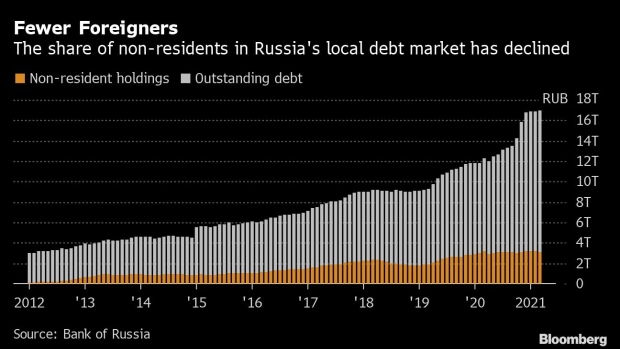May 13, 2021
Russia Plans Bond Buybacks to Fix Pandemic-Warped Debt Market
, Bloomberg News

(Bloomberg) -- Russia’s debt chiefs are working on a mechanism that will allow the government to retire costlier ruble bonds sold to raise emergency funds during the coronavirus pandemic.
“The goal is to restore the right structure of the portfolio so that in the next crisis, government debt can be used to conduct an active economic policy again,” Deputy Finance Minister Timur Maksimov said. He didn’t elaborate on the timing or the amount of money the ministry might earmark for the purchases.
Russia doubled its borrowing plan last year to help shield the economy from the pandemic as oil prices collapsed and the U.S. weighed sanctions on ruble debt sales. In a series of blowout auctions dominated by local banks, the Finance Ministry sold floating-rate bonds offering a coupon that climbs with the central bank’s key rate.
Now that inflationary pressures are mounting and the Bank of Russia is back on a tightening path, Maksimov wants to shift away from the more expensive borrowing. Floating-rate debt now accounts for about 35% of the ministry’s outstanding local bonds, and Maksimov said he wants that level cut back to 15% or 20%.
Joe Biden’s administration imposed long-feared sanctions on Russia’s debt markets earlier this year, punishing the Kremlin for U.S. elections meddling and hacking.
But the penalties were ultimately judged to be mild because they only bar U.S. investors from buying ruble bonds, or OFZs, on the primary market. Bonds and the ruble have strengthened since the limits were announced.
Read More: Goldman, Hedge Funds Hail Russia as Winner in Covid Recovery
“The imposed restrictions don’t cover the secondary OFZ market, so we don’t expect the share of non-residents to move far from the current levels,” Maksimov said. “International investor interest, which can’t be satisfied on the primary market, may show up as demand on the secondary market.”
Foreigners held around 19% of Russia’s sovereign ruble debt as of April 21. The ministry sold more than 45 billion rubles ($604 million) of notes at debt auctions Wednesday.
‘Smooth Flow’
“If the market situation allows us to borrow more in advance, we may do so, but we’d work on making the borrowing flow more smoothly,” Maksimov said. “Our weekly needs, taking into account the amount raised, are now at 45 billion to 50 billion rubles.”
International flows into local bonds have been positive so far this month, VTB Capital analysts led by Maxim Korovin wrote in a note Wednesday. About 57 billion rubles left the ruble debt market in the week following U.S. sanctions in April, according to the central bank.
The picture for local debt is far from clear, and Rosbank analysts said the ruble-bond market is “in limbo.”
Stabilizing global rates and support from local banks are an argument against selling, they said. But the prospect of further rate hikes, as well as some possible rebalancing before sanctions take effect on June 14 are weighing on the bonds for now.
©2021 Bloomberg L.P.


